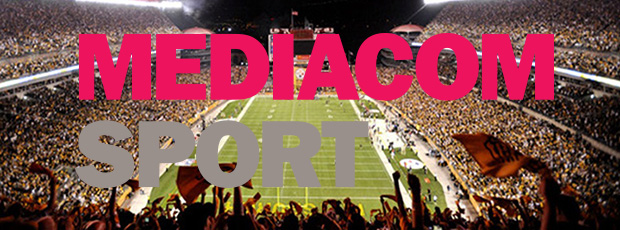… noch intensiver an einem Sportereignis teilhaben lassen.
Bei seiner Jurytätigkeit merkte er, dass es mittlerweile sehr viel Content gibt, bei dem es stärker um die Verbindung mit einem gesellschaftlich relevanten Thema geht, als um die reine Funktion eines Produktes. Um herauszustechen müssen die Marken maßgeschneiderten Content für die richtigen Plattformen erstellen und am besten etwas zeigen, was die Menschen nie vorher gesehen haben.
Er war selber beim Fußball-Pokalfinale in Berlin, als Helene Fischer auftrat. Sport ist die größte Leidenschaft der Menschen, man darf das Erlebnis nicht stören. Was in USA, wo er ursprünglich herkommt, funktioniert, kann man nicht auf Deutschland übertragen. Authentizität ist der Schlüssel zu gutem Branded Entertainment im Sport. Ein teueres Sport-Sponsoring sei nicht zwingend Voraussetzung. Dagegen sollte man beachten: Menschen lieben Helden, sie verbinden sich mit Menschen und nicht mit Marken.
Hier das ganze Interview mit Misha Sher in englischer Sprache.
BEO: Are sports and entertainment working well together? Misha Sher: Sports is blurring the line between what is just sports and what is just entertainment. If you look at National Football League, for example, is it a sports or an entertainment product? You see, that the lines are becoming blurred.
Misha Sher: Sports is blurring the line between what is just sports and what is just entertainment. If you look at National Football League, for example, is it a sports or an entertainment product? You see, that the lines are becoming blurred.
The power of storytelling in sports is very powerful. Many companies try to raise awareness through sports: The key question is how can they show their products and what they do in an emotional environment.
GoPro is a good example. The camera is a lifestyle product, giving people the opportunity to see the world in a way have never seen before. The brand has an NHL National Hockey League partnership, with cameras on Hockey Players’ helmets. They bring people closer and let people see the game from an angle they did not before. People want to participate, to come closer.
GoPro has now extended the scale of the partnership by creating NHL After Dark, an 11-part series filmed and produced by GoPro that will give hockey fans an immersive look at what happens on the ice during after-hours training sessions. The idea is to transport the fans directly onto the ice with an up-close and personal look at some of NHL’s most talented players.
It’s one example that demonstrates the merger of sports and entertainment.
BEO: You are a judge at Cannes Lions Entertainment. What did you see so far?
Misha Sher: I’ve already seen hundreds of campaigns before the real judging starts and the questions we’re going to have to ask ourselves are: What is Branded Entertainment? It is diverse: Is it short form, is it a series?
Even before that debate, however, you can see trends. One is that companies want to attach themselves to important and relevant topics. Food brands, for example, are trying to create meaningful content. They want to celebrate what we have in common rather than what separates us. Brands are looking to unite people by celebrating diversity and inclusion. People connect to that content.
Companies start to become adjusted to “the idea, not only to the purpose”. For example: You can buy a toothpaste from anybody. Now brands realize that people want to support the “attitudes they have themselves” via their brands choices. A lot of content is created around purpose rather than about function. It remains very difficult to stand out and get noticed.
BEO: Why is it so difficult to stand out and what would you suggest to brands?
Misha Sher: There are two main challenges. Challenge A is: Everyone does the same thing. Creating news that can compete within the news cycle is a battle that’s only getting crazier. People are used to clicking quickly through all the stuff, because there is so much out there.
That brings us to Challenge B: How do you get people’s attention in a way that they are captivated to watch, and maybe to share? The authentic solution is to make the content that is very bespoke to the audience and the platform.
Some audiences have gone from TV already and you have to use the media where they are. If you try to reach Millennials who do not watch TV but do Snapchat and e-gaming, or other technologies such as Virtual Reality, you need to show them something they have never seen before.
I would say use sports! Sport is the biggest passion point that most people have. In art, in music – it is not at the same level, people are connected to sports.And there are so many opportunities for storytelling in sports, like promotional rights or working with a team.
Coca-Cola, for example, sponsors the World Cup and creates content around it. Coca-Cola takes the FIFA World Cup Tour and travels with it in Africa, Asia, and beyond. It will give more than a million people around the world the chance to see and experience the ultimate football prize ahead of the 2018 tournament. Sports taps into emotions and is an outlet for people.
BEO: What do you have to object concerning sports and entertainment? What about Helene Fischer at the soccer game in Berlin?
Misha Sher: I was at the Bundesliga game between Borussia Dortmund and Eintracht Braunschweig in Berlin, where Helene Fischer sang. You should not interrupt in an environment that people chose to be in. The aim should be to enhance the experience of people present. It’s all about the insight.
When we are doing consulting for brands, we look at what they are trying to do in a particular market. The answer will differ depending on who you’re trying to reach. What they are interested in? Authenticity is key. People can see if you want to sell them something.
They did not see the entertainment Helene Fischer might be adding to football. You have to ask yourself: whom you are bringing as a singer? What makes you think, that most of the fans will like that? You don’t want to force someone to listen.
I am American. I live in London. In London at a football game, if a guy was selling hot dogs, fans would become angry. In USA it is fun and entertainment to eat during the game. You have to be very sensitive of who you are going to reach.
Actually the show in USA is bigger than the actual game. But people in Germany and the UK are quite protective about the beautiful game.
BEO: Sports Entertainment seems to be expensive? Do you need to sponsor a game?
Misha Sher: You do not always have to sponsor a game. You can work with talent and you can create great content with them. Talents have special attributes. For example, Manuel Neuer saved Germany. He is reliable so he might be a good fit for an insurance company.
Bastian Schweinsteiger is powerful and hard-working, Joachim Löw is very classic and elegant. You can work with the right one who fits the brand.
You can create something authentic, a very powerful work featuring one or more individuals. People like heroes. They connect to people not to brands.
BEO: Thank you very much Misha, for that very interesting interview.

